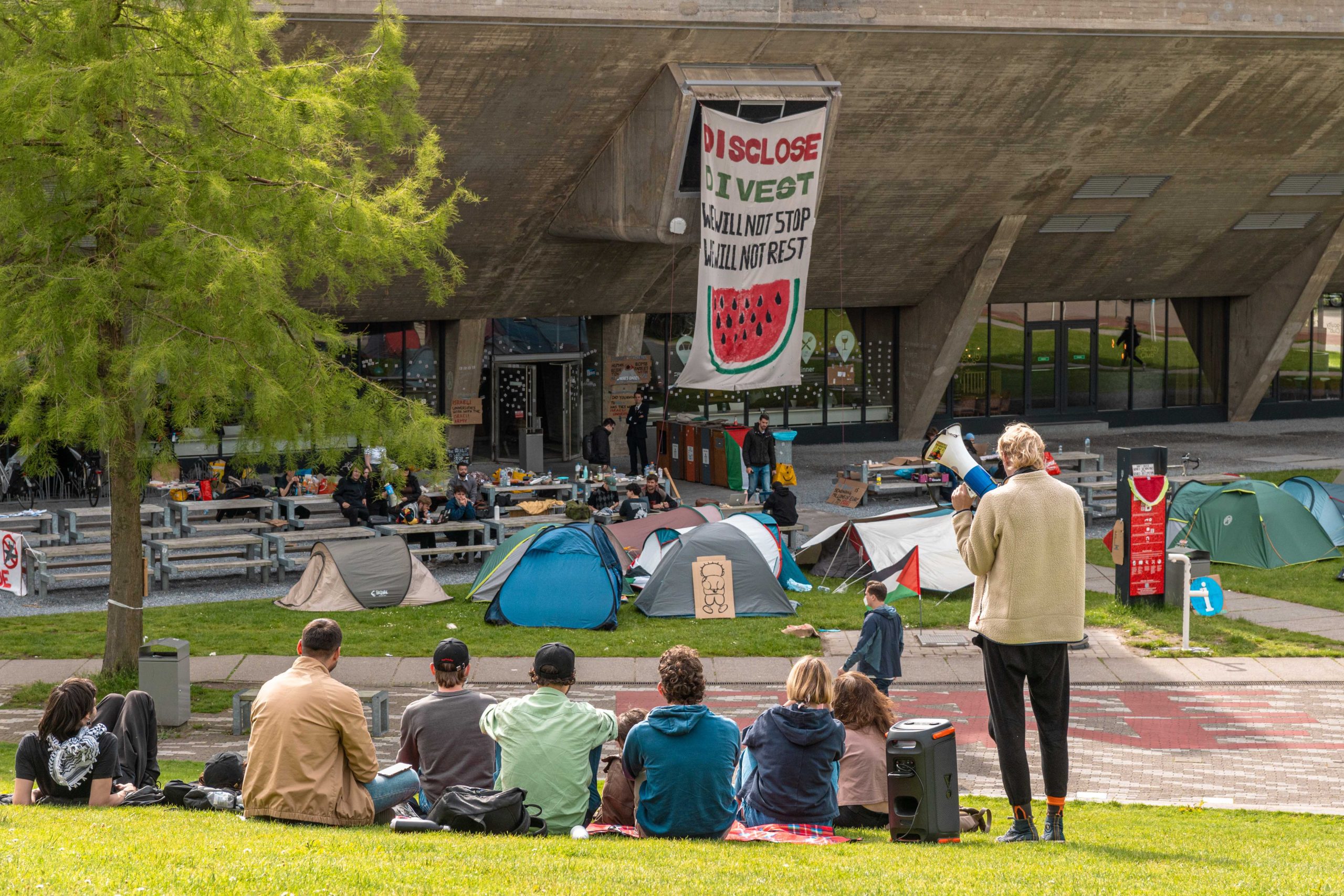What is permitted and what is prohibited if you demonstrate on campus? Delta asked Amnesty International, the human rights organisation. Marjolein Kuijers, their expert on the right to demonstrate in the Netherlands, answers.
The tented camp at TU Delft. (Photo: Thijs van Reeuwijk)
- Do protesters on campus have to comply with TU Delft’s guidelines?
Two days before protesters set up their tent camp on TU Delft’s campus, TU Delft issued demonstration guidelines. These were based on the Universities of The Netherlands’ Directive (in Dutch) that was put together jointly by this group of universities. While a directive like this can give clarity for both sides, it is not a holy grail, says Kuijers. “Should its contents not be in line with the right to demonstrate, a judge will not consider the Directive.”
The starting point of the international right to demonstrate is that demonstrations are always permitted as long as they are peaceful. Incitement to hatred, discrimination or violence is not permitted. “There are only a couple of good reasons, so-called legitimate interests, to curtail a demonstration,” says Kuijers.
So it is thus not up to employees of TU Delft to decide what is and what is not permitted, as the Directive says it is, about noise for example. “The fact that loud noise can be a hindrance, is not enough of a reason to intervene,” explains Kuijers. More about disturbing the peace in question 3.
- May TU Delft ask for demonstrations to be announced in advance?

Photo: Marjolein Kuijers
Nothing is mentioned about announcing a demonstration in demonstration legislation. But under Dutch law, municipalities may ask this of demonstrators. Almost all municipalities say that you must report a demonstration in advance. But, says Kuijers, simply not meeting the announcement criteria is not a reason to ban a demonstration.
The law does not cover universities, but Kuijers says that this can be applied to universities. “It is good to announce a demonstration, and definitely if the university includes this in its guidelines. The university can then take measures to ensure that things proceed safely. It can also create goodwill and ensure that the different sides continue to communicate.”
Kuijers says that Amnesty often sees that demonstrators do not announce their protest because of fears of curtailment. “But curtailing action can only be done under very strict conditions. Universities are required to create the space for protest.”
- May a demonstration be a nuisance factor for others?
“Without the peace being disturbed, it would not be a good protest as you would then not attract any attention,” says Kuijers. This means that a demonstration may be noisy or block access. It may even result in lectures being cancelled or that people cannot study in peace and quiet in the TU Delft Library. In contrast to what TU Delft states in its guidelines, blockages are permitted.
But this does not mean that all kinds of disruptions may happen. In answer to the question of what the boundaries are, Kuijers does not have a ready answer. She says that this depends entirely on the circumstances. Two cancelled lectures is different than if all lectures at TU Delft cannot go ahead for weeks.
‘You cannot say in advance that blocking access is forbidden or occupying a building is forbidden’
Should the core tasks, such as teaching and research, be seriously hindered, taking action to end a demonstration is more legitimate than if one lecture hall is occupied and the lectures have to be moved to other spaces. Judges will weigh up everything to determine if preventive action was proportionate.
- When and how may preventive action be taken?
During the interview, Kuijers repeatedly says that taking action to prevent or break up a demonstration is only permitted if it is necessary and proportionate. It is only permitted if there was no other way to solve a situation and it must be in relation to the degree to which the demonstration would damage legitimate interests, such as safety.
Kuijers watched with surprise at how situations escalated at some universities. The police seemed largely unaware of how the military police in full riot gear would escalate the conflict, she says. “I understand that these are tense situations. At the same time, I see a row of military police facing a group of frustrated demonstrators. This will not calm the situation down.”
There is a lot of ground to be gained, she concludes. “This is why I strongly emphasise the importance of dialogue. First talk to each other before you act to suppress the action.” This also applies to the protesters. “Do not avoid a discussion. You do not need to share your tactics, but you can show that you have given the situation some thought, for example about what to do if the emergency services need to come.”
- In the right to demonstrate, what is the difference between a demonstration, a tent camp, and an occupation?
Tent camps and occupation of buildings and roads for example are also protected under the right to demonstrate, says Kuijers. “You cannot say in advance that blocking access is forbidden or occupying a building is forbidden. Every demonstration should be assessed according to the circumstances that apply.” So how a protest is done does not determine whether the demonstration falls under the protection of the right to demonstrate. The key question is thus whether the demonstration will be peaceful or not.
When End Fossil occupied a hall in the Faculty of Mechanical Engineering (ME) last autumn, they had to vacate the building on the first evening as the building closed at 8:00 PM. The demonstrators left peacefully after the police announced that they would arrest anybody who did not cooperate.
Kuijers does not think that ending a demonstration only on the grounds of a closing time is legal. But there are more considerations at play. “You need to think of the implications should the building have to stay open. And think about how many security officers you need and how much time the demonstrators have had to make their point.” All these kinds of factors need to be considered, she says. “It always depends on the circumstances. The most important thing is that peaceful protest must always be given space and not be limited in advance.”
- May demonstrators be anonymous?
Protesters in the tent camp give Delta fake names. Some of them cover their faces. Under Dutch law, this is forbidden in Government, healthcare and academic buildings. This is also prohibited on campus grounds under the UNL and TU Delft guidelines. Apart from this, the UNL also states that those taking part must ‘always’ be able to identify themselves with a student card or proof of identity.
Kuijers explains that under international demonstration law – which is higher than Dutch law in the legal hierarchy – you may take part in a protest anonymously. It is highly conceivable that students prefer to remain anonymous, says Kuijers, now that some universities are punishing protesters.




Comments are closed.